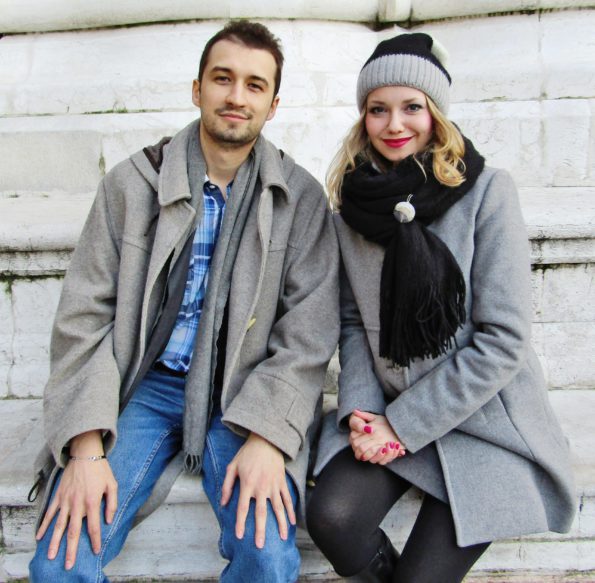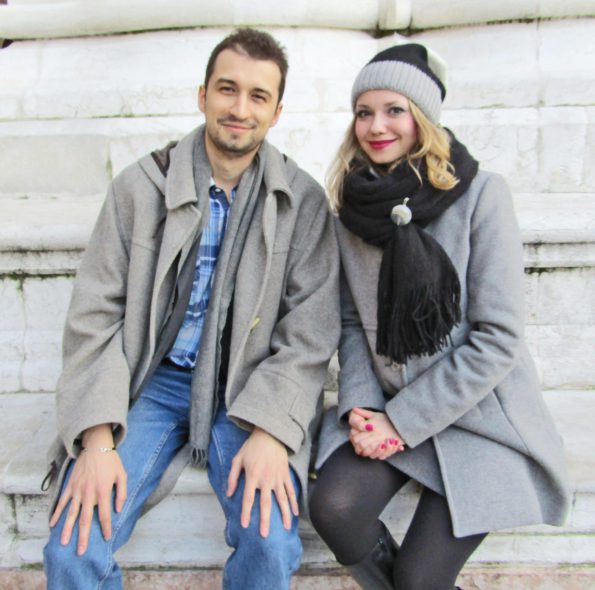FROM BOLOGNA TO HOLLYWOOD. A MAJOR FILM MUSIC STAR HAS ARRIVED
After Ennio Morricone, Italian double Oscar for movie music, Luca Balboni is a promising Italian composer that follows in Morricone‘s footsteps and tries his hand abroad. Luca‘s home town is Bologna, where he was born in 1985 and graduated in piano performance. He also studied composition at the Conservatorio GB Martini. As he said during our interview recorded in March 2016, two men, the Academy Award winners: Michael Giacchino and Luis Bacalov, led him to devote himself to film musical composition.
The story of his professional career is very interesting and full of unexpected, important meetings and opportunities. In 2013, after the meeting with Christopher Young in Cordova, he moved to the U.S.A. following the mentoring program of the composer in Los Angeles. In the same year he composed the original music of the drama/thriller feature Midway by John Real (Italian production) and joined the team at Hans Zimmer’s studio, Remote Control Productions – the best music studio in Hollywood!
In 2015, Luca worked for several animated films included The Big, The Bad and The Bunny for SVA Computer Art of New York. Then, he worked on the score of the movie Mine starring Armie Hammer known for The Lone Ranger, The Social Network, The Man from U.N.C.L.E., among whose producers included Peter Safran (Buried, The Conjuring, Annabelle) and Miguel A. Faura (Enemy). These famous collaborators formed Luca will surely permit him to shine in large international production soon.
That is a lot to say about the Italian and American movie business. Luca, working between these two countries, knows it well and admitted that the major difference is approach. Sitting with me and the author of our photographic service, Daniele Flaiban, in a cafe in Rizzoli street in the center of Bologna, Luca confessed that he definitely can’t imagine his life without creating something from his own and his next work is a movie by Kristoph Tassin with an Italian cinema star, Marco Bocci, entitled Watch them fall.


You are a young film music composer. Who influenced you and how did your music evolve up until now?
There are a lot of composers who influenced me: Hans Zimmer, John Williams, John Powell, the brothers Gregson-Williams, Danny Elfman, Michael Giacchino, James Horner, Christopher Young, Ennio Morricone… shall I continue? It’s difficult to have a real evolution and find your own style when a production asks you: “Listen to this track. Great, can you re-produce something very similar?”. I care a lot about what the director wants but at the same time I also love to propose something of my own, when possible. I think for this reason my music has evolved a little in these last years. In this job, evolving also means to score a scene and then asking to yourself “Ok, this is an idea, am I able to do something more unusual?”.
During your stay in Los Angeles you had opportunity to join the team at Hans Zimmer’s studio. How do you remember that experience and City of Angels?
It was a great experience and the most important starting point of my long path in film music. I can’t talk about the details because I signed a Non Disclosure-Agreement, but I can talk about Remote Control as the best school I could attend. During a session, I remember I was sitting behind Hans and Steve Mazzaro, listening to music made for The Lone Ranger. After the music was played for the first time, naively I said: “Beautiful!”. Hans looked at me a little weird and he answered: “Don’t say that. I mean, until when the director listens to the music and approves it!” He was right, because a musical piece could sound cool, but scoring a film is, first of all, a team effort: it’s essential to understand with the director what is best for the picture.
In 2013 you worked for an Italian film Midway by John Real. Was it your first thriller/mistery music soundtrack? Is it a gender of film you prefer to work on?
Not the first one of this genre, because I previously worked on a couple of features with Marco Werba and the film True Love with Andrea Bonini, even when this one had sci-fi elements and was more focused on the love story. About Midway, John Real put a little drama as well, he didn’t want to make just a “thriller”, but a mixture of moods to make the story more compelling. Generally I don’t like to focus on a single genre and it’s pretty difficult to classify a project this way, because the plot could talk about so many different things. Also, I love to range as much as possible. If I have to choose, I love wide-range films because I can usually express the music in every possible way. One of the most interesting and funniest thing in this job is that every day there’s a different challenge, a different way to feel and compose music.
How long does it take you to prepare music for a feature movie? Which film from your curriculum vitae do you consider the best work made?
I think the time to prepare music for a feature movie depends on the delivery and how fast you are in reaching the right target. I’m usually able to make a track of a few minutes in a couple of hours, but when I go back on it after a while, I can find something which improves the music and makes the difference. That’s why I prefer to take as much time as I can. The personal relationship with the director helps the process a lot, because, if he really trusts the composer, there is much more artistic freedom and it’s possible to discuss the mood of the film also before the first roughcut. That’s happened to me while I scored Her Ring, a film by a young and talented director, Alessandro Amante. We had a vision together before he started to shoot the project. There was a scene about a dream by the main character, without dialogues, set between a hospital and a beach. It was very difficult to score because so many things happened there, and this means several feelings at the same moment. The editor tried to put a sad song on it and the director tried, as a temp-track, a piece that I had already composed. Both probably fit the picture, but for me something was missing, a “spark” that would characterize the film. I proposed 2 or 3 different versions of new music to Alessandro, but I pushed especially one, based on the second movement of the Winter by Vivaldi. I didn’t just re-play the original composition, I used some musical elements from it, they became mine and then a new original composition was born. I think that was the icing on the cake. But it happened only because Alessandro trusted me, he was open to experiment, taking the risk to make something different (and maybe bad). Otherwise that composition would have become just an usual, rhetoric and sad music fit for any drama movie. I don’t know about the entire film, but I can say that scene of Her Ring is probably one of my best jobs until now.
Who are the world composers you admire? How do you find the music of your compatriot, this year Oscar winner, Ennio Morricone?
About film scores, there are dozens of composers who I admire, too much maybe, impossible to make a short list of them. In addition to those who I said influenced my path, I also appreciate some “new” composers like Cliff Martinez, Johann Johannsson, Lorne Balfe, Junkie XL and Henry Jackman. They made some remarkable works. Morricone is a genius, what he has done is beautiful and unforgettable without a doubt. I think he should have won an Oscar long before this year!
How do you approach the music? What does it mean to you? Can you imagine your life without composing?
If you consider the music in a cold, practical way, it is a business. A successful track has to sound very good and capture what appeals to most people. Real success means for me “sharing” and not “appearing”, because everything can end up on the first page of a magazine, even the worst one. But in a more artistic vein, music sublimes the emotions. This means for me that the most important thing to consider is: what will make this music unique? Which emotions will I bring with it? I probably can imagine my life without composing. Don’t get me wrong, I absolutely love it and I would never change this path for any reason. But music is a path that I’ve chosen and maybe I could choose something else. Society tends to influence us in all things. So there’s somebody who prefers to use something already prepared, made by a factory for the occasion: a dress, a thought, a phrase, a piece of music. Well, I love, as much as I can, to personalize the things that I see and learn, to create something that comes from me, from my weaknesses, my passions. So yes, in this case, I definitely can’t imagine my life without creating something of my own.
Presently you are working on the soundtrack for an American production, “Mine”. What is the film and the music about?
Well, the production was handled by Peter Safran‘s company involving the main actor Armie Hammer, but it was vital the contribution of Spain and Italy, represented respectively by the producers Miguel Faura and Andrea Cucchi. I can’t say too much about the plot for now, but imagine a fragile and emotive soldier, who after a failed assassination mission, finds himself stranded in the desert. The music in this movie is like the Desert: wild and changeable, sometimes gentle, like as the Desert were a Mother who gives hope to Mike, but sometimes powerful and terrifying, like the elements from which he must survive.
What is the piece you are the most proud of? What kind of music are you dreaming of right now to realize in the future?
I do not have a specific piece in mind at the moment, sometimes I’m proud of a music that after a few months I would re-make from zero. The real satisfaction depends a lot on how much artistic freedom I have and what I’m able to express in a project. About the future, when I make lot of plans, I start to forget to think of “Now”. So I can dream several pieces of music that I want to realize in the future, but this job is so fickle, and, much more often than you imagine, when you expect to do something you do something else, maybe better than you thought before. It’s a constant surprise…and I like that!
For a long time you have been composing for animation films. What gave you this experience? Would you repeat it?
I really love to score animation films and of course I would do it again, it has enriched a lot my wealth of personal experience. I think in Live action the music is an invisible actress that often needs to stay in the movie. An animation film is owned by the score and it’s possible to explore all kinds of music styles.
I know that you are also realizing a music for an Italian film, coming very soon in tv/cinema. Are there many differences between working in your country and the United States?
Basically yes, between my country and the United States, there are some differences. One of the biggest is the approach. US tends to be more international and in their movies there are all kind of possible situation: Action, Animation, Fantasy, Comedy, Drama, Sci-fi and many times there’s a mixture of all of them in the same movie. Also, everything is organized as Big Industry. About film scoring for example, how Remote Control Productions is built, there are no comparisons in terms of resources, technique and organization. I’m talking about what happens in Hollywood, but, even with different budgets, in the independent film environment they think pretty much in the same way. Italy is very far from all this, most of the movies are comedies and dramas which involve only our culture, religion and history, so it’s pretty difficult to have a worldwide distribution: something that all people are able to watch and understand. The film with Marco Bocci that I’m scoring right now is actually an Italian film even when it doesn’t looks Italian at all. The director Lucas Pavetto, who is supervising the post-production, is taking care to package it as an international product. This approach is different than usual in my country, bringing a lot of benefits and broadening the perspectives. In the next few years Italy is going to breath something new in cinema. Just in the latest months, the new imminent film by Fabio Guaglione and Fabio Resinaro, or Fast as the Wind, or They call me Jeeg Robot, are turning the static Italian situation into something really cool.
PHOTO GALLERY by Daniele Flaiban @ Video by Daniele Flaiban and Richard Blanshard







